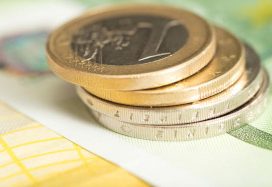Home / Forex news / Euro Rallies Against Dollar on Upbeat German PPI, and Eurozone PMIs

Today, the euro rallied higher against the much weaker dollar, extending yesterday’s gains buoyed by the positive euro area PMI reports released by Markit Economics. The EUR/USD currency pair rallied higher as investor sentiment towards the single currency turned bullish, boosted by the region’s improved COVID-19 vaccine rollout.
The EUR/USD currency pair rallied from a low of 1.2082 in the Asian market to a high of 1.2141 in the early European session and was near these highs at the time of writing.
The currency pair’s initial rally was driven by optimism about the eurozone’s vaccine rollout after the European Commission finalised an order for 300 million Moderna vaccines yesterday. The release of the upbeat Germany producer price index report for January by the Federal Statistical Office, which came in at 1.4% versus the consensus estimate of 0.8%, drove the pair higher. The positive Markit Germany preliminary Manufacturing PMI, which came in at 60.6 versus the expected 56.5 print, also lifted the pair. The Markit Flash Eurozone Manufacturing and Composite PMIs, bot of which beat expectations, also boosted the pair. The downbeat services PMIs had a muted impact on the euro.
The pair was also supported by the upbeat Italian consumer price index report released by Istat. The in-line French inflation data released by Insee also boosted the pair. As tracked by the US Dollar Index, the dollar’s weakness also fueled the fibre’s rally.
The currency pair’s future performance is likely to be influenced by the US PMI releases and geopolitical events.
The EUR/USD currency pair was trading at 1.2141 at 10:58 GMT, having risen from a low of 1.2082. The EUR/JPY currency pair was trading at 127.86 after rising from a low of 127.65.
If you have any questions, comments, or opinions regarding the Euro, feel free to post them using the commentary form below.
Original from: www.earnforex.com
No Comments on “Euro Rallies Against Dollar on Upbeat German PPI, and Eurozone PMIs”